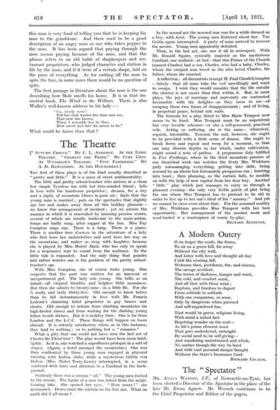The Theatre
[" AUTUMN CROCUS." BY C. L. ANTHONY. AT THE LYRIC THEATRE. " CHARLES THE THIRD." BY CURT G oTZ AT WYNDHAM'S THEATRE. "FIVE FARTHINGS." BY A. R. RAWLINSON. AT THE HAYMARKET.] THE first of these plays is of the kind usually described as " pretty and little." It is a mass of sweet sentimentality.
The little and pretty school-teacher who arrives at a clean but simple Tyrolese inn with her firm-minded friend ; falls in love with the handsome proprietor ; dreams, for a day and a night, of mountain Misses in pure air ; finds that the young man is married ; puts on the spectacles that slightly age her and makes away from all this holiday glamour— we know this arrangement of incident ; yet we admire the manner in which it is renovated by amusing pension scenes, several of which are totally irrelevant to the main action. Songs are badly sung, after supper at the Inn. Miss Fay Compton sings one. There is a harp. There is a piano. There is another hors d'oeuvre in the adventure of a lady who first loses her underclothes and next loses her way on the mountains, and makes us sway with laughter, because she is played by Miss Muriel Aked, who has only to speak for a responsive roar to sound from the audience. So the little tale is expanded. And the only thing that puzzles and rather worries one is the problem of the pretty school- teacher's age.
With Miss Compton, she of course looks young. One suspects that the part was written for an innocent or inexperienced girl. The lady acts young. She talks as an infant—all virginal timidity and helpless little mousiness. But then she admits to twenty-nine—in a little fib. For she is really and truly thirty-five. Old enough to know better than to fall instantaneously in love with Mr. Francis Lederer's charming hotel proprietor in gay braces and shorts. Old enough to refrain from climbing mountains (in high-heeled shoes) and from waiting for the dashing young fellow beside shrines. But it is holiday time. One is far from London and the L.C.C. These things will happen on tours abroad. It is entirely satisfactory when, as in this instance, they lead to nothing ; or to nothing but a " romance."
What a pity that one could not have seen the last act of Charles the Third first ! The play would have been more intel- ligible. As it is, one watched a superfluous prologue in a sort of stupor. (Again, a hotel amongst the mountains.) One was then confronted by three young men engaged in physical training with Indian clubs, while a mysterious Griffin von Raben (Miss Mabel Terry-Lewis) interrupted, in a scene scattered with hints and allusions to a Cardinal in the back- ground.
Suddenly there was a scream " off." The young men rushed to the rescue. The figure of a nun was fished from the neigh- bouring lake. She opened her eyes. " How sweet ! " she murmured. Down came the curtain on the first act. What on earth did it all mean ? In the second act the rescued nun was for a while dressed as a boy, with beret. The young men fluttered about her. The Gran again interrupted. A party of nuns arrived to recover the novice. Young men apparently defeated.
Then, in the last act, one saw it all in retrospect. With Mr. Ronald Squire, cynically majestic as the mysterious Cardinal, one realized—at last—that this Prince of the Church (named Charles) had a son, Charles, who had a baby, Charles, whom the escaped nun loved as she also loved Charles, his father, whom she married.
A reflection : all dramatists (except M. Paul Claudel) imagine —falsely—that all nuns take the veil unwillingly and want to escape. I wish they would consider that the life outside the cloister is not easier than that within it. But, in most plays, the joys of marriage and maternity are contrasted favourably with the delights—as they seem to me—of escaping those• two forms of disappointment ; and of living, in perpetual peace, behind safe walls.
The formula for a play fitted to Miss Marie Tempest now
seems to be fixed. Miss Tempest must be an impenitent but very lovable schemer—or else a self-possessed, practical wife. Acting or suffering, she is the same : whimsical, roguish, irresistible. Towards the end, however, she ought to be provided with a little scene of drama. She ought to break down and repent and weep for a moment, so that one may discern depths in her which, under cultivation, might sound a note of pathos. A programme duly fulfilled in Five .Farthings, where in the third mountain pension of one theatrical week one watches the lively Mrs. Wickham gaily mismanaging everything, getting into debt, being rescued by an idiotic but fortunately prosperous son ; bursting into tears ; then planning, as the curtain falls, to muddle on with the help of new capital from her dear boy. Anothei
" little " play which just manages to carry us through a pleasant evening—the only very feeble patch of plot being the one where Miss Tempest has to pretend to be old hi order to live up to her son's ideal of his " mumsy." And yet we cannot be cross even about that. For the assumed senility of Mrs. Wickham provides Miss Tempest with her best opportunity. Her management of the crochet work and wool-basket is a masterpiece of comic by-play.
RICHARD JENNINGS.














































 Previous page
Previous page